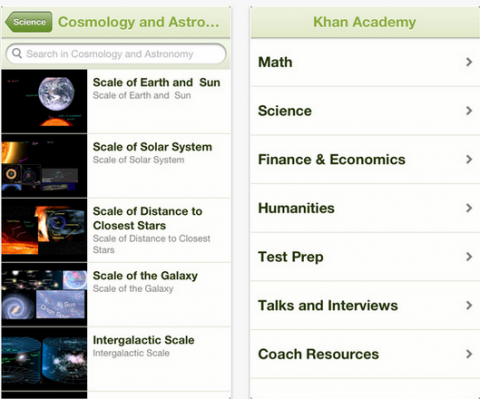 Non-profit Khan Academy, an organization dedicated to “providing a free world-class education for anyone anywhere,” does so primarily through online video courses and lectures. The over 3600 videos are free and access is open to anyone (anywhere), allowing K‑12 students to study math, science, computer science, finance & economics, humanities, and test prep. The organization was founded in 2006 by MIT and Harvard grad Salman Khan, who began by tutoring relatives and friends in Bangladesh while he worked as a hedge fund analyst in the States. His videos became so in-demand that he decided to quit his job and distribute them full-time, funded by donations from individuals and major donors like the Bill and Melinda Gates Foundation.
Non-profit Khan Academy, an organization dedicated to “providing a free world-class education for anyone anywhere,” does so primarily through online video courses and lectures. The over 3600 videos are free and access is open to anyone (anywhere), allowing K‑12 students to study math, science, computer science, finance & economics, humanities, and test prep. The organization was founded in 2006 by MIT and Harvard grad Salman Khan, who began by tutoring relatives and friends in Bangladesh while he worked as a hedge fund analyst in the States. His videos became so in-demand that he decided to quit his job and distribute them full-time, funded by donations from individuals and major donors like the Bill and Melinda Gates Foundation.
While there is a healthy amount of skepticism about the efficacy of Khan’s methods, there’s no shortage of demand for the kind of instruction he offers to students all over the world. To further meet that demand, Khan Academy has just released an app for iPhone and iPod Touch. Unlike the app released this past March for the iPad, the iPhone version does not allow interactivity. Users can view videos but cannot, as with the iPad app, download playlists, read subtitles, and log progress, making this version “more for consumption rather than full interaction.” Nevertheless, and whether critics like it or not, this represents a further step for distance learning, as education increasingly moves out of the classroom and into the handheld devices of networks of students no longer restricted by geography or physical mobility.
The app has been added to our brand-spanking new collection: 200 Free K‑12 Educational Resources: Video Lessons, Web Sites, Apps & More
Via Makeuseof
Josh Jones is a doctoral candidate in English at Fordham University and a co-founder and former managing editor of Guernica / A Magazine of Arts and Politics.


The internet is here to stay and Khan is doing a great thing giving education freely to people who would ordinarily not get it. This is a wonderful idea for especially the developing world that have a high mobile phone reach.
All he has to do is to create content for cheaper phone models.
Online learning is becoming more and more accessible through websites such as Khan or MathTV.com.